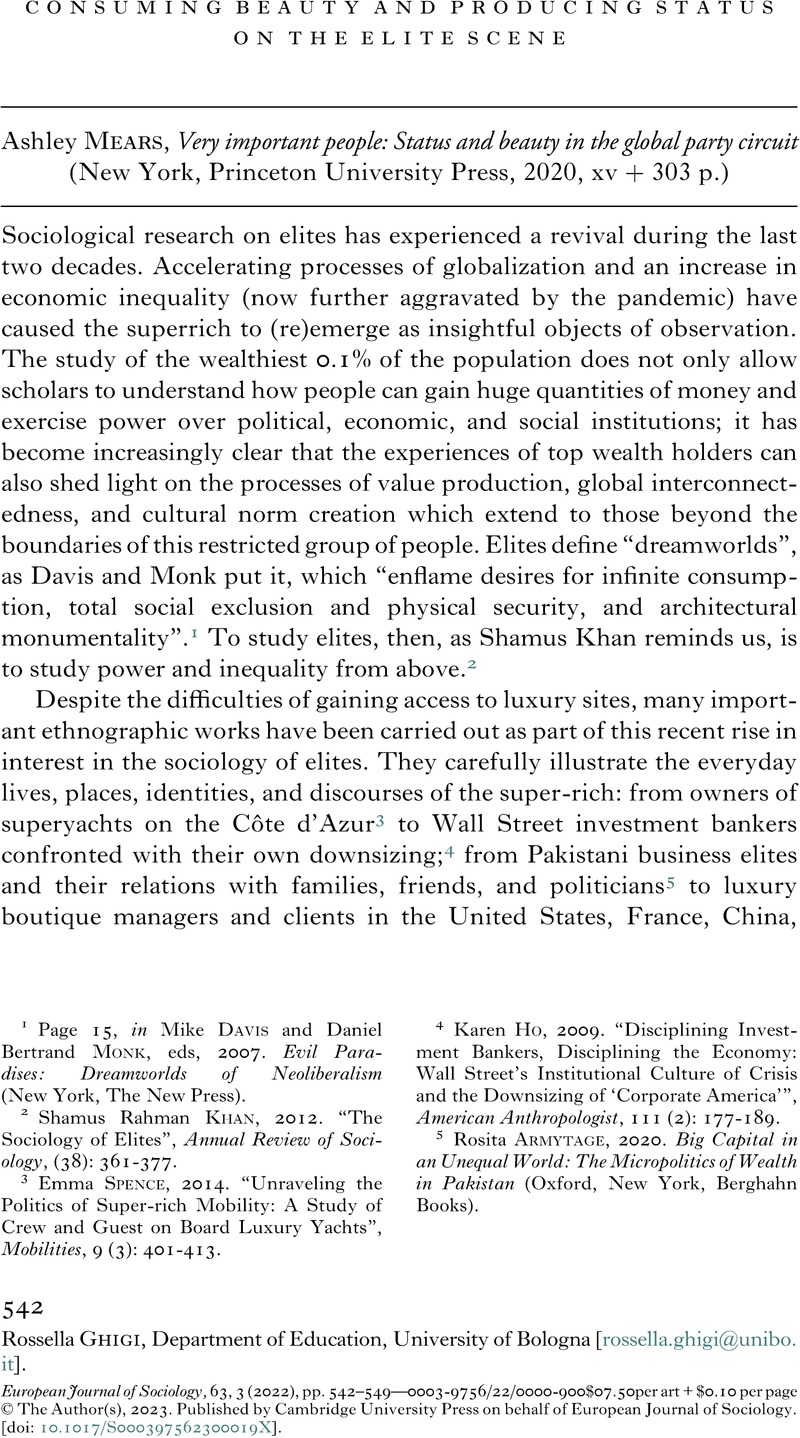No CrossRef data available.
Article contents
Consuming Beauty and Producing Status on the Elite Scene - Ashley Mears, Very important people: Status and beauty in the global party circuit (New York, Princeton University Press, 2020, xv + 303 p.)
Review products
Published online by Cambridge University Press: 23 February 2023
Abstract

- Type
- Book Review
- Information
- European Journal of Sociology / Archives Européennes de Sociologie , Volume 63 , Issue 3 , December 2022 , pp. 542 - 549
- Copyright
- © The Author(s), 2023. Published by Cambridge University Press on behalf of European Journal of Sociology
References
1 Page 15, in Mike Davis and Daniel Bertrand Monk, eds, 2007. Evil Paradises: Dreamworlds of Neoliberalism (New York, The New Press).
2 Shamus Rahman Khan, 2012. “The Sociology of Elites”, Annual Review of Sociology, (38): 361-377.
3 Emma Spence, 2014. “Unraveling the Politics of Super-rich Mobility: A Study of Crew and Guest on Board Luxury Yachts”, Mobilities, 9 (3): 401-413.
4 Karen Ho, 2009. “Disciplining Investment Bankers, Disciplining the Economy: Wall Street’s Institutional Culture of Crisis and the Downsizing of ‘Corporate America’”, American Anthropologist, 111 (2): 177-189.
5 Rosita Armytage, 2020. Big Capital in an Unequal World: The Micropolitics of Wealth in Pakistan (Oxford, New York, Berghahn Books).
6 Jean-Baptiste Welté, Julien Cayla and Eileen Fischer, 2022. “Navigating contradictory logics in the field of luxury retailing,” Journal of Retailing, 98 (3): 510-526.
7 Brooke Harrington, 2016. Capital Without Borders: Wealth Managers and the One Percent (Cambridge, Mass., Harvard University Press).
8 Justin Farrell, 2020. Billionaire Wilderness: The Ultra-Wealthy and the Remaking of the American West (Princeton, NJ, Princeton University Press).
9 Rachel Sherman, 2017. Uneasy Street: The Anxieties of Affluence (Princeton, NJ, Princeton University Press).
10 Shamus Rahman Khan, 2011. Privilege: The Making of an Adolescent Elite at St. Paul’s School (Princeton, NJ, Princeton University Press).
11 Ashley Mears, 2011. Pricing Beauty: The Making of a Fashion Model (Berkeley, University of California Press).
12 Khan 2012, cf. infra: 362.
13 Jamie L. Mullaney and Janet Hinson Shope, 2012. Paid to Party: Working Time and Emotion in Direct Home Sales (New Brunswick, Rutgers University Press).
14 Mullaney and Shope 2012: 14.
15 Thorstein Veblen, 1899. The Theory of the Leisure Class: An Economic Study of Institutions (New York, The Macmillan Company).
16 Lisa A. Keister, Sarah Thébaud and Jill E. Yavorsky, 2022. “Gender in the Elite,” Annual Review of Sociology, (48): 149-169.
17 Ibid.




